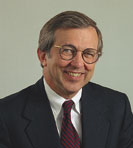 The honors program: A college within the college The honors program: A college within the college
by Charles Steger Virginia Tech is indeed fortunate to attract some of the most talented college-bound students from across the commonwealth and throughout the nation. While many of these students are here because of our nationally recognized professional programs, they also recognize that a broad-based educational experience is key to understanding the world in which we live and to their success in life. Promising young minds seek challenging intellectual environments. Our community of scholars in the honors program helps us recruit additional highly qualified students. These same students help raise the level of discourse in classrooms throughout the campus. Last year, I proposed that we further strengthen our honors program by creating an endowed honors college. Even now, our honors program is a great success. With almost 1,800 of our best and brightest students participating, it already has the size and feel of a small college. Our program is somewhat unique; we don't have a regular regimen of honors courses. Instead, students are encouraged to create their own programs of study. Double majors, such as music and architecture, abound. Many undergraduate students work with our leading faculty members on research projects. These students bring a zeal for learning that elevates the entire classroom environment. A stimulating honors program helps faculty members to recharge their batteries and adds excitement to the teaching/learning process. The honors students help keep the curriculum on the cutting edge. The independent studies of some students actually act as forerunners for new courses, as was the case for a new course in chaos theory. Young scholars are not born; they are nurtured. And when they leave, they spread the good word about their positive experiences. People like David Lester '94, a young man from rural western Virginia, blossomed in the honors program. Before deciding on Harvard, he was accepted at 10 of the nation's elite law schools. Or Mark Embree '96, a Rhodes Scholar now doing post-doc work at Oxford. Or Stacy Smith, a Marshall Scholar now studying at Britain's University of Redding. Or the 15 or so Goldwater Scholars matriculating from this program over the past six years. And most recently, Sarah Airey '01, who was just named a Marshall Scholar. All become ambassadors for Virginia Tech. Interestingly, as the demand for intellectual rigor escalates, the honors program continues to grow. Twice in the past three years, we've raised the minimum requirements. Yet, the number of students accepted into the program is increasing. Under the guidance of the Academy of Teaching Excellence and a dedicated staff, it has become a university showpiece. A key component of the university's next major fundraising campaign will be to create an honors college endowment of $25 million. Such a college will provide a rich and rigorous education for future generations of students who seek that extra measure of challenge for themselves. And it will ensure that every young person who can meet the admissions standards can attend, regardless of his or her economic circumstance. |